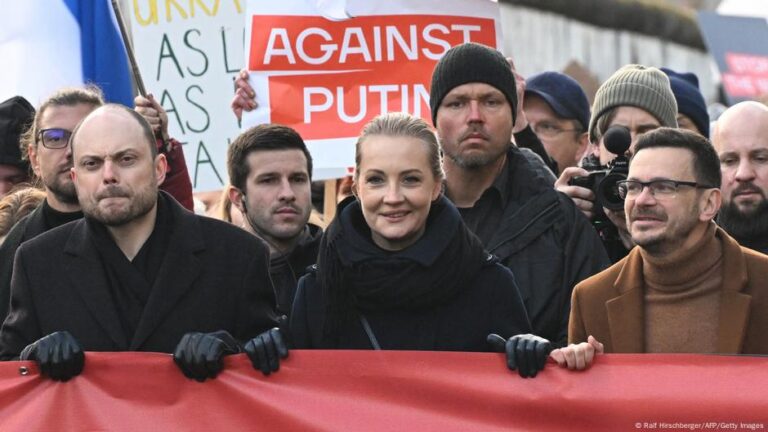Bogdan Leonov, a Russian national, is building a chain of power-bank rental stations in Cyprus and Greece, and setting up a franchise in Portugal.
His WE53 startup, launched in 2023, has already seen annual revenues rise to about €600,000 ($693,000)and it now employs dozens of people. The network currently boasts almost 3,000 stations.
His previous brainchild provided the same service in Russia.
But setting up a business abroad was particularly challenging as he had to learn all operational activities by himself, from scratch. Even “repeating” one’s own success in a new environment was far from easy.
“You can’t copy-paste barely anything. Infrastructure, labor law, cultural behavior — everything is different. The biggest pain for me is banking. I sometimes have to work as a compliance officer myself,” he told DW.
Maksim Satanovsky, another Russian national now based in the German city of Dresden, launched a dumpling business, delivering homemade dumplings to customers.
He also thought of opening a restaurant serving Russian cuisine, but instead set up a factory — named Dawaj-Dawaj — that produces dumplings and other frozen food.
Confronting challenges abroad
Hundreds of thousands of Russians have fled their home country since Moscow launched its full-scale invasion of Ukraine in February 2022.
They have migrated to places like Israel, Armenia, Georgia and other European countries to try to build new lives.
Some have turned to entrepreneurship setting up new businesses and startups abroad — in a wide array of sectors ranging from IT and media to bookstores and dumpling factories.
These new firms have faced challenges involving funding and compliance, but many have successfully established their operations.
Dutch firm Nebius, for example, which provides graphics processing units (GPUs) for training AI models, emerged last year after it was spun out from Russian internet giant Yandex.
Yandex was nicknamed “Russia’s Google” for uniting its own search engine with a raft of digital services like email and maps.
The company’s global expansion plans took a hit in the wake of the Ukraine war. Facing EU sanctions, its founder and CEO Arkady Volozh left Russia and denounced the conflict.
The company then sold its Russian assets in July 2024 at a hefty discount.
The $5.4 billion (€4.67 billion) cash and shares deal marked the largest corporate exit from Russia since February 2022.
After its rebranding as Nebius, the firm’s shares resumed trading on the Nasdaq stock exchange in New York under the new identity.
From book stores to intellectual hubs
Even some Russian civil society actors who have fled the country in recent years are setting up organizations abroad to continue their work.
Babel Books, for instance, is a Russian-language bookstore in Berlin founded by Natalya Smirnova.
Following Russia’s invasion of Ukraine, one of her friends set up a bookstore for the Russian diaspora in the Israeli city of Tel Aviv.
Smirnova was inspired by the move and opened a similar store in Berlin in September 2023.
The bookstore has since turned into an intellectual hub for Russian speakers in the German capital. Intimate and cozy, the bookstore feels more like a private apartment with plenty of bookshelves.
It focuses on contemporary literature, nonfiction and art, and hosts frequent events like lectures and book presentations.
Smirnova managed to squeeze nearly 5,000 printed titles into the 42 square meters (452 square feet) of space on the ground floor of a building right where the Berlin Wall once stood.
Freedom Letters, the biggest and fastest-developing Russian publishing houses in exile, is one of the suppliers for Babel Books.
The company’s motto is: “Books that are no longer possible in Russia.”
To survive, such businesses need to be extremely cautious and inventive, says Freedom Letters’ founder Georgy Urushadze, adding that they rely heavily on volunteers.
“We have layout and two of six permanent printing facilities in Latvia, most of the authors in Germany and Ukraine, cover artists in Spain, Georgia, Austria and elsewhere,” he told DW.
In addition, proofreaders are in Israel, Spain and France while 14 editors work from multiple countries, Urushadze said, highlighting the complex cross-border arrangement in a bid to evade the long arm of the Kremlin.
The examples of Babel Books and Freedom Letters show how exiled Russian intellectuals are creating entire business ecosystems.
Russia’s loss, other countries’ gain
Entrepreneurs and tech talent leaving Russia is not new but the trend has accelerated since the start of the Ukraine war.
Those who leave are mostly young, educated people coming primarily from large, digitalized urban areas, with developed infrastructure and a highly competitive business environment.
Research by the Warsaw, Poland-based Center for Analysis and Strategies in Europe (CASE) has shown that 60% of them are reporting income of over $3,500 per month — well above the EU average.
Prominent businesses set up abroad by Russian tech specialists over the past two decades include Revolut, a successful UK-based fintech app, and the messaging service Telegram.
Revolut’s founder Nikolai Storonsky even renounced his Russian citizenship.
As the war drags on, the odds of these businesspeople returning to Russia grow increasingly slim.
At the same time, other countries stand to gain as Russian talent abroad launches new ventures — some of which could become the next Telegram or Revolut.
Edited by: Uwe Hessler


